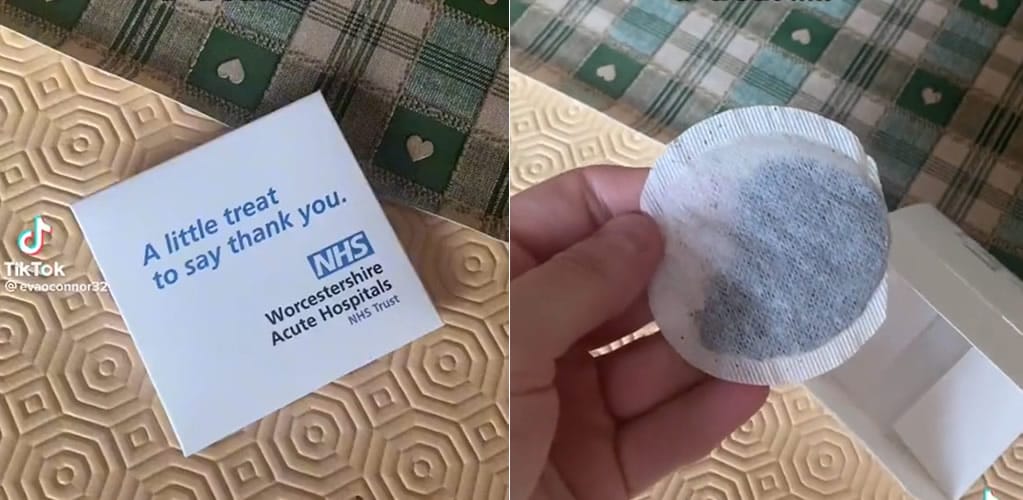Context matters – How a teabag went viral for the wrong reasons.
When they saw a video on social media showing how a hospital sent a single teabag to their staff to thank them for their work, people naturally took it at face value and started commenting and sharing it without knowing the context.

When they saw a video on social media showing how a hospital sent a single teabag to their staff to thank them for their work, people naturally took it at face value and started commenting and sharing it without knowing the context. But in a civilised society, context is key in understanding things.
First published: August 2022.
A video seen on TikTok by millions of people – and since retweeted on other social media platforms too – claimed to be showing what a member of staff from Worcester Acute Hospitals had received as a thank you treat.
In the video, the TikTok user simply wrote the words: “What my dad got at work as a ‘treat’.....” and started to open a small envelope containing a single teabag in it.


Other social media users started to show their obvious anger on social media over what they saw as an appalling gift from the NHS Trust at a time when NHS staff are exhausted, under more pressure than ever, understaffed, facing unmanageable workloads, suffering from moral distress and moral injury, and PTSD due to the pandemic.
Some examples of comments:
Aware of the video, Matthew Hopkins, the CEO of Worcestershire Acute Hospitals NHS Trust, responded to it by a thread on Twitter to give a bit of context about how the Trust had actually thanked their staff:
“We’re hugely grateful for the hard work of staff caring for our communities and always seeking new ways to show kindness to our teams.
“We work with Worcestershire Acute Hospitals Charity and trade union partners on how best to show our appreciation. (Note of the editor: The charity supports the services, staff and patients of Worcester Acute Hospitals NHS Trust)
“This included offering every colleague an additional paid day off as a thank you for their incredible efforts during the pandemic.
“Over Christmas and New Year fortnight, we provided a free meal each day for every member of staff in our hospitals.
“Last year we relaunched our Staff Recognition Awards as another way of saying thanks to some of our teams.
“We offer wide-ranging support to promote their mental and physical wellbeing.
“We also continue to offer free parking for all staff at all our sites.
“As well as all the above, as an extra small but sincere thanks on International Day of the Midwife and International Nurses’ Day in May, we sent individual certificates and Worcestershire Acute Hospitals Charity-funded gift bags with items including a branded tea bag encouraging staff to take a break.
“The certificates and gift bags were another way to say to our staff how much we appreciate them and share the important work our hospital charity is doing to support them.
“It’s a shame one small part of one of many ways we say ‘thank you’ has been taken so out of context.”
When they see a shocking photograph or an appalling video on social media, people tend to take them at face value and start commenting and sharing them without trying to know a bit more about the context or checking whether what they see is what has really happened.
This story shows how context is so key in understanding something.
It is certainly not easy or possible to fact-check everything we see or watch online, but it is essential to slow down a bit, learn to be more patient and less jumpy, and do some homework before joining the crowds:
- SEARCH — Search whether it is a claim (opinion) or a fact (evidence, part of a report or a news article);
- EVALUATE — Evaluate the accuracy of the claims (try to find evidence that supports them);
- THINK — Think about the context (ask yourself what the claims leave out);
- TEST — Find different sources to corroborate the claims (look for reliable sources to test the claim against).
In our civilised society, we must all use critical thinking to avoid being part of the crowds who believe everything they are told by devious politicians, who trust every single word of biased and dishonest media, who think ignorance is bliss, and who end up destroying reputations, careers, and lives.

GOING FURTHER:

|

|
— AUTHOR —
▫ J.N. PAQUET, Author & Journalist, Editor of PMP Magazine.
Sources
- Text: This piece was first published in PMP Magazine on 12 August 2022.
- Cover: Screenshot of TikTok/evaoconnor32.






[Read our Comments Guidelines]